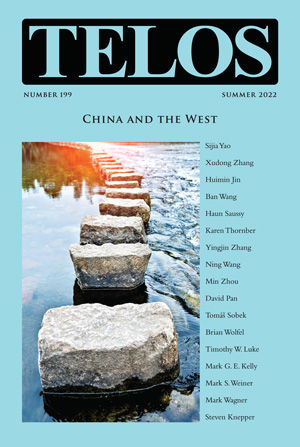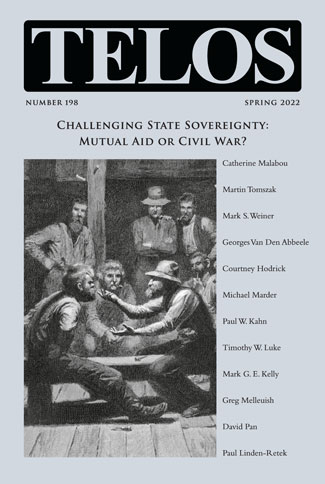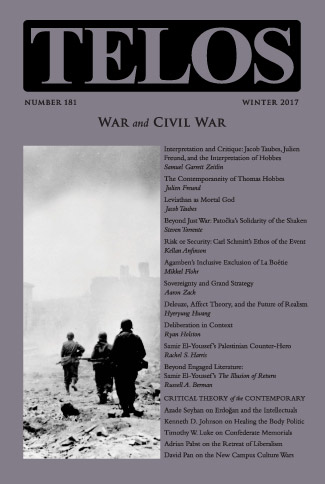 If we are seeing a rise in political violence today, is the main cause a decline in tolerance? On today’s episode of the Telos Press Podcast, I discuss the concept of tolerance with Tomáš Sobek, whose essay on the subject appeared in Telos 199. He argues that tolerance cannot be equated with liberalism, or rather that there are two ways of understanding the meaning of liberalism. While a positive form of liberalism contains a set of values that today would include support for abortion rights and gay marriage, a negative form of Liberalism (let’s call it Liberalism with a capital L) is limited to tolerating viewpoints or practices that one does not agree with. From this perspective, Liberal tolerance would include a conservative opposed to abortion who is willing to tolerate its practice. On the other hand, liberal (with a small l) tolerance would not include tolerating gay marriage, which the liberal in any case supports, meaning there is nothing to tolerate. Since one only tolerates something with which one is in disagreement, liberal tolerance would have to include something like tolerance of racism, even though one opposes it. Of course, it may be that some things are not to be tolerated, for instance murder, and some anti-abortion advocates would classify abortion as a form of murder and therefore intolerable, and liberal anti-racists might similarly classify racist prejudice as intolerable, to the point of advocating violence to oppose it.
If we are seeing a rise in political violence today, is the main cause a decline in tolerance? On today’s episode of the Telos Press Podcast, I discuss the concept of tolerance with Tomáš Sobek, whose essay on the subject appeared in Telos 199. He argues that tolerance cannot be equated with liberalism, or rather that there are two ways of understanding the meaning of liberalism. While a positive form of liberalism contains a set of values that today would include support for abortion rights and gay marriage, a negative form of Liberalism (let’s call it Liberalism with a capital L) is limited to tolerating viewpoints or practices that one does not agree with. From this perspective, Liberal tolerance would include a conservative opposed to abortion who is willing to tolerate its practice. On the other hand, liberal (with a small l) tolerance would not include tolerating gay marriage, which the liberal in any case supports, meaning there is nothing to tolerate. Since one only tolerates something with which one is in disagreement, liberal tolerance would have to include something like tolerance of racism, even though one opposes it. Of course, it may be that some things are not to be tolerated, for instance murder, and some anti-abortion advocates would classify abortion as a form of murder and therefore intolerable, and liberal anti-racists might similarly classify racist prejudice as intolerable, to the point of advocating violence to oppose it.
|
Telos 198 (Spring 2022): Challenging State Sovereignty: Mutual Aid or Civil War? is now available for purchase in our store. Individual subscriptions to Telos are also available in both print and online formats.
In spite of this fragmentation, though, there are two main concerns that are shared. In the first place, there seems to be a general recognition among these different perspectives that the inhabitants of a state are not completely homogeneous and that the internal heterogeneity of a state should be at least in part the basis for domestic order. If libertarians prefer market-based structures and traditional conservatives look to family and religion, liberals seem to have gravitated toward identity-based groupings, and anarchists might prefer mutual aid organizations as independent places of sovereignty within which individuals can define themselves. The disagreements concern the type of heterogeneity that is being called for as well as the precise mechanisms for supporting diverse organizations within the state. Isaac Lopez has argued in a commentary published recently on this site that Trump has a good chance of winning this November because the liberals have replaced “American values” with laws and norms that are foreign and enraging. In response, the “silent majority” (in fact, a minority) of Americans elected “a very stable genius.” This essay is about the nature of an aspect of Donald J. Trump’s governance that has been overlooked: his cult. None of the usual political arguments can explain the desperate stances taken by his followers. The explanation offered here is twofold: One is the need for reversing a feared path to secular “socialism.” The second is that Trump has asserted that reality is subject to his will and personality. Ancillary to this is the idea that Trump’s persona can unify America by subordinating “difference” to a mythic national identity. Donald Trump has, for a large minority (possibly 40 percent of the electorate), the persona of a mythic Hero. A Hero who can overcome all obstacles by sheer will. Through a close reading of Trump’s angry language, one realizes that Trump has woven a recognizable myth for citizens bereft of purpose and power. This is Trump’s will-to-power. Trump has given meaning and purpose to people losing out to technology, urban wealth, science’s truth, and social helplessness exacerbated by the pandemic. He is a hero of revenge against regulators, the media, and modernity itself. Even the pandemic cannot overcome him; he overcomes the pandemic, until recently. Telos 181 (Winter 2017): War and Civil War is now available for purchase in our store. |
||||
|
Telos Press Publishing · PO Box 811 · Candor, NY 13743 · Phone: 212-228-6479 Privacy Policy · Data Protection Copyright © 2024 Telos Press Publishing · All Rights Reserved |
||||









